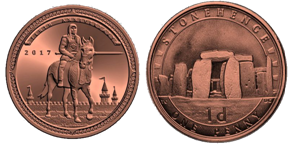British monarchs do not always use their first name, or the name that the public becomes familiar with as crown prince, once they become king. George VI was previously known as "Prince Albert", as was Edward VII before him. Prince Charles' full name is "Charles Philip Arthur George". In theory, he could pick any of those four names as his reign-name. "King Philip" still carries Spanish overtones and "King Arthur" would be just plain pretentious, so we can safely rule both of those out. "Charles" also has negative connotations, with Charles I being the only British monarch to lose his throne and his head in a popular revolt. Prince Charles has gone on the record saying he would prefer naming himself "King George VII", after his grandfather. But we won't know for sure until he actually becomes king.
All of which is beside the OP's question: will Latinized names still appear on British coins?
The only other Commonwealth realm on which Latin appears on the coinage is Canada. Since Canada no longer has official Latin titles, I suspect Latin will be dropped from the coinage there for the next monarch.
The Latin titles for the Queen are still current in Britain, so there is no need to discontinue their use there. However, Latin titles have become unfashionable, as has the language itself, despite recent announcements by certain members of government to try to restore Latin to the education curriculum. Apart from the occasional motto, only three countries still use Latin routinely on their coinage: Vatican City, Switzerland (where using Latin is a space-saver since there isn't room on coins for all four official languages) and Great Britain. It's possible that pragmatism will trump tradition in this instance.


